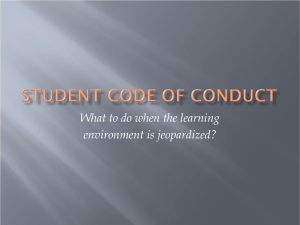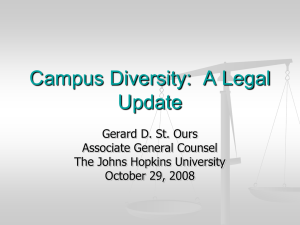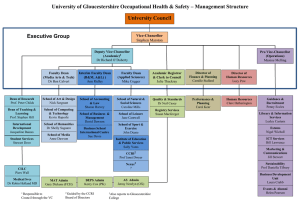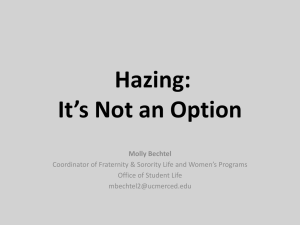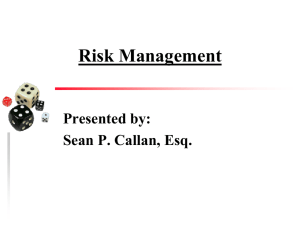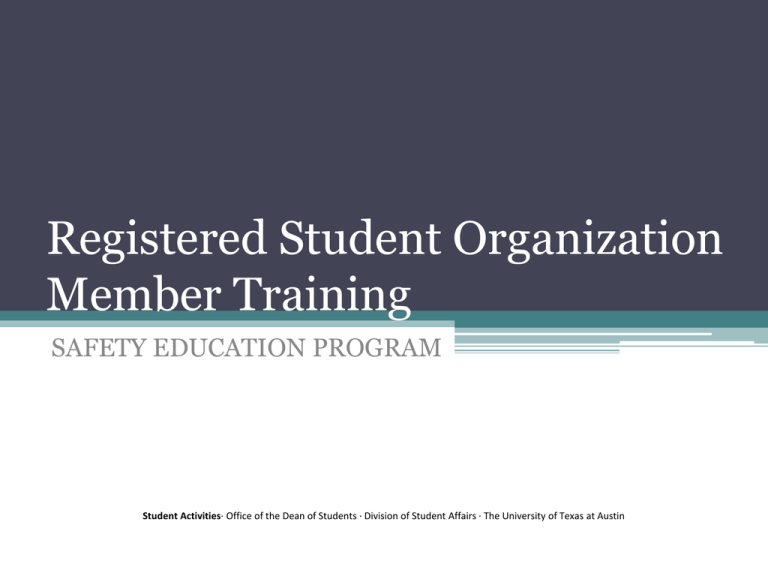
Registered Student Organization
Member Training
SAFETY EDUCATION PROGRAM
Student Activities∙ Office of the Dean of Students ∙ Division of Student Affairs ∙ The University of Texas at Austin
Required Safety Topics
1. Possession and use of alcoholic
beverages and illegal drugs;
2. Hazing;
3. Sexual assault and harassment;
4. Fire and other life safety issues;
5. Registered student organization
travel;
6. Behavior at organization events; and
7. Adoption of a risk management
policy.
Hazing Prevention
SAFETY EDUCATION PROGRAM
Student Activities∙ Office of the Dean of Students ∙ Division of Student Affairs ∙ The University of Texas at Austin
Hazing Defined
Hazing is defined as any intentional, knowing,
or reckless act occurring on or off campus of
an educational institution, by one person alone
or acting with others, directed against a
student, that endangers the mental or
physical health or safety of a student for the
purpose of pledging, being initiated into,
affiliating with, holding office in, or
maintaining membership in any
organization whose members are or include
students at an educational institution.
But what about consent?
• Texas Law
▫ Sec. 37.154 states that Consent is Not a Defense:
“It is not a defense to prosecution for the offense under this
subchapter that the person against whom the hazing was directed
consented to or acquiesced in the hazing activity.”
• University Policy
“The fact that a person consented to or acquiesced in a hazing
activity is not a defense to prosecution for hazing under the law.”
Myths and Facts about Hazing
MYTH: Hazing is only a problem for sororities and fraternities.
FACT: Hazing is a societal problem. Hazing incidents occur among athletic
teams, marching bands, the military, spirit organizations, religious clubs,
professional schools and other types of organizations.
MYTH: “Eliminating hazing makes an organization just like any other
social club. It will be too easy to become a member.”
FACT: Any group can haze new members - that's the easy way out. It takes
vision and commitment to run a good, non-hazing program.
MYTH: “A little hazing should be okay, as long as there's no mean-spirited
or injurious intent.”
FACT: Regardless of intent, some group bonding activities designed to be
"all in good fun" still may raise some serious safety concerns.
Reporting Obligation
According to UT - Austin’s Institutional Rules,
Chapter 16, Prohibition of Hazing Policy, a
person must report:
• If you believe you have been subjected to hazing; or
• If you have knowledge of hazing activities
If you become aware of or were subjected to hazing,
please report the incident to the Office of the Dean of
Students.
• Online:
http:/deanofstudents.utexas.edu/complaint.php
• By Phone: (512) 471-3065
Potential Consequences
• Individual Discipline
▫ The dean of students may initiate disciplinary
proceedings against a student accused of violating
the hazing prohibition policy.
• Organizational Discipline
▫ The dean of students may also initiate disciplinary
proceedings against an organization accused of
violating the hazing prohibition policy.
• Criminal and Civil Liability
▫ Through the criminal process, the District Attorney’s
office can investigate and press charges against the
organization and the individual(s). Through the civil
process, individuals can be sued as an organization and
as an individual.
Drug Possession, Use, and Abuse
SAFETY EDUCATION PROGRAM
Safety Education∙ Office of the Dean of Students ∙ Division of Student Affairs ∙ The University of Texas at Austin
Facts About Drugs at UT - Austin
Past Year Use:
• 28% of UT-Austin students smoked marijuana during
the last year
• 31% of UT-Austin students used illicit drugs during the
last year
Lifetime Use (at least once):
• 44% of UT-Austin students have smoked marijuana
• 7% of UT-Austin students have used cocaine
• 7% of UT-Austin students have used amphetamines
• 7% of UT-Austin students have used Ecstasy
• 10% of UT-Austin students have used other illicit drugs
Drug Problem Red Flags
Life problems related to the drug use
Setting and exceeding limits
Making promises about use and breaking those promises
Lying about or trying to hide the amount/frequency of
drug use
Forgetting or denying things that happened while
intoxicated
Behaving very differently when intoxicated than when
sober
Avoiding social functions where drugs are not available.
Feeling guilty, embarrassed, or remorseful about things
done/said while intoxicated
Very high tolerance
Potential Affected Areas
• Health and Well-being
• College Education
• Graduate School or Employment
• Participation in Athletic Activities
• Family, Friends, and Peers
Intervening: Taking Action
Talk with a Professional
University Health Services: (512) 475-8252
Office of the Dean of Students: (512) 471-5017
Counseling and Mental Health Center: (512) 471-2255
Confidentially Report Your Concerns
Behavioral Concerns Advice Line: (512) 232-5050
(24 hours a day, 7 days week, 365 days a year)
Conduct an Intervention
Help a peer or friend understand and accept the nature
of their relationship with drugs, ask them to address
the problem, and lead them to help.
Alcohol Use and Abuse
SAFETY EDUCATION PROGRAM
Student Activities∙ Office of the Dean of Students ∙ Division of Student Affairs ∙ The University of Texas at Austin
Alcohol Overdose
Critical medical situation if:
• Passed out and cannot be awakened or is semiconscious but incoherent
• Vomiting without awakening
• Shallow, irregular breathing
• Cold, clammy, pale, bluish skin
• Seizures, convulsion, or rigid spasms
What to do
• Call 911 IMMEDIATELY
• Put the person in the recovery positions (Bacchus
Maneuver)
• Stay with the person until help arrives
University Policy
• Clearly prohibits underage drinking and other
violations consistent with state law
• Student(s) subject to discipline whether conduct
takes place on or off campus or whether civil or
criminal penalties are also imposed for such conduct
• Ignorance of the policy does not protect from
disciplinary action
• Important to become familiar with UT policies
• Go to www.healthyhorns.utexas.edu/ruleslaws.html
University Policy - AMECH
• AMECH = Alcohol Medical Emergency Call for Help
• Free service to currently enrolled UT students
• Avoid disciplinary action from Student Judicial
Services
• Call 911 for immediate help; later you will be
referred to SJS for the suspected alcohol incident
• Eligible student(s) referred to education and
consultation without formal disciplinary action
• Declining education or failing to comply makes you
subject to formal disciplinary action
• More information, call SJS at (512) 471-2841
State Law Issues
• Many students familiar with state laws
• Underage, excessive drinking, and alcoholinfluenced behavior most common violations
• Impaired driving commonly problematic
• Many students fail to discourage drinking and
driving
• Find least drunk person for designated driving
instead of sticking to sober driving instead
• Many unfamiliar with Affirmative Link
• Go to www.healthyhorns.utexas.edu/ruleslaws.html
Protect Yourself
Reasonable Efforts:
• Prevent service of alcohol to minors (check IDs)
• Have food & non-alcoholic beverages available
• Avoid drinking games
• Call for help (fights, injury, or alcohol overdose)
• Provide all guests safe rides home
Reducing Risk of Sexual Assault
SAFETY EDUCATION PROGRAM
Student Activities∙ Office of the Dean of Students ∙ Division of Student Affairs ∙ The University of Texas at Austin
Definition of Sexual Assault
Sexual Assault occurs when a sexual act
is directed against another person when
that person has not consented, is
incapable of consenting, or when the
act is forced.
Consent
Is…
Is not…
• Based on choice
• Active, not passive
• Only possible when there is
equal power
• Giving one’s permission by
actively saying, “Yes”
• Negotiable at each stage of
intimacy: saying yes to one
sexual act does not indicate
yes to everything
Giving in because of fear or
coercion
Based on manipulation,
deception, or lying
Possible when one person
has more power
Clear when alcohol and
drugs are
involved…Substances impair
our ability to consent as well
as our ability to read
another’s signals/body
language
Predatory Drugs
Alcohol is the most frequently used drug to facilitate
sexual assault.
Other drugs include GHB, Rohipnol, and Ketamine
which often affect memory and the ability to control
one’s limbs/body.
These can be easily slipped into someone’s
individual drink or into a group drink that is not
being monitored.
The use of these drugs to facilitate sex with someone
without their knowledge constitutes sexual assault.
How can we lessen our organization’s risk?
• Have someone designated to monitor and
control the distribution of alcohol.
• Establish an organizational culture that does not
tolerate sexually predatory behaviors and holds
the offenders of such behavior accountable with
tangible consequences.
• Intervene when you observe coercive or
questionable behavior.
How can we lessen our organization’s risk?
Attend functions, parties, etc. with at least
one other person that you trust. Arrive
together and leave together. Look out for
each other while at the function.
If you choose to drink, maintain control of
your particular drink. If you set it down or it
is out of your control for any period of time,
throw it out and get a new one.
Begin and continue dialogues about these
issues.
Have resources available for the ongoing
education of your organization’s members.
Sexual Harassment/Misconduct
SAFETY EDUCATION PROGRAM
Student Activities∙ Office of the Dean of Students ∙ Division of Student Affairs ∙ The University of Texas at Austin
Sexual Harassment/Misconduct
• Sexual Harassment is a form of sex
discrimination that involves the imposition of an
unwanted condition or requirement on the
continued employment or education of the
victim. Two forms of sexual harassment:
• Quid pro quo harassment
• Hostile environment harassment
• Sexual Misconduct is conduct of a sexual
nature that, although not so serious or pervasive
that it rises to the level of sexual harassment, is
unprofessional and/or inappropriate for the
educational and working environment.
Where can Sexual Harassment Occur?
• Sexual Harassment can occur anywhere on- or offcampus.
▫ Not confined to particular location
▫ The number of incident at a location reflects the
amount of time students spend there
• Among students who have been harassed:
▫ 39% were in a dorm or student housing
▫ 37% were outside on campus grounds
▫ 24% were in common areas of campus buildings
▫ 20% were in classrooms
▫ 27% were “someplace else”
▫ 12% were unsure where they were harassed
How to Report Sexual Harassment
Any student who believes that he or she may have
been subjected to sex discrimination, sexual
harassment, or sexual misconduct by a member
of the faculty or staff of the University, fellow
student, or visitor or contractor to the University
campus is encouraged to consult with or report
such conduct immediately to any of the following
persons or offices:
Dr. LaToya Hill
(512) 471-5017
Latoya.hill@austin.utexas.edu
Ms. Katherine Green
(512) 471-1849
katherine.antwi.green@austin.utexas.edu
Fire and Life Safety
SAFEY EDUCATION PROGRAM
Student Activities∙ Office of the Dean of Students ∙ Division of Student Affairs ∙ The University of Texas at Austin
How to respond to a crisis at your event
• Call for help.
• Stay calm.
• Be prepared to give as much information
possible to 911 and the responding emergency
personnel.
• Contact the Office of the Dean of Student as
soon as possible to get assistance with how to
address media, if necessary, and see what
resources they can offer. Call (512) 471-5017.
Crime Prevention
Use the blue light call boxes on campus if you
need assistance.
Use the buddy system and walk in well lit areas.
Use UTPD to provide security for on-campus
events.
Keep your valuables out of sight in your car and
don’t forget to lock your doors.
Take a R.A.D. (Rape Aggression Defense)
program class
Sign up for Campus Watch.
Contact UTPD to borrow their engraver to
engrave your belongings.
Visit UTPD website at www.utexas.edu/police.
My friend is acting strange…
• Behavior Concerns Advice Line (BCAL)
▫ (512) 232-5050 or www.utexas.edu/safety/bcal
▫ For concerns about a member of the UT
community.
▫ Can be anonymous if calling the 24 hour line.
▫ Can submit a report on-line through the website,
which requires a UT EID logon.
If you see it…report it.
Slippery floors
Water leaks
Broken glass
Strange odors (gas leak, fire, chemical, etc.)
Lights out
Broken doors and/or locks
Emergency equipment missing or not
working
A person who doesn’t belong in a particular
area
Weapons
• It is a violation of Section 11–804 of the
Institutional Rules on Student Services and
Activities to
▫ “possesses, uses, or displays firearms, facsimile
firearms, ammunition, explosives, or other
weapons on property owned or controlled by the
University, without written permission from the
dean of students” including university residence
halls
• Both students and registered student organizations
who wish to bring a weapon or facsimile weapon
onto the UT campus must have advance permission
from the Office of the Dean of Students.
▫ http://deanofstudents.utexas.edu/pses/download
s/WeaponsApprovalForm.pdf OR
▫ Call (512) 471-5017
Registered Student Organization
Travel
SAFETY EDUCATION PROGRAM
Student Activities∙ Office of the Dean of Students ∙ Division of Student Affairs ∙ The University of Texas at Austin
University Travel Policies (Domestic)
(When do they apply?)
SSO Travel Policy
RSO Travel Policy
Applies to all travel to domestic
destinations more than 25 miles
away from the main campus
that involves:
Applies to all travel to domestic
destinations more than 25 miles
away from the main campus in
which:
sponsored student
organizations, OR
enrolled students attending
events or activities that are
organized and/or sponsored by
the university.
a registered student
organization requires a student
member(s) to attend the
activity or event.
University Travel Policies (International)
(When do they apply?)
All UT students, including sponsored and
registered student organizations, must comply
with university travel policies for international
destinations.
It DOES NOT matter:
whether the travel is "required" for a member; or
what the purpose is of your organization's
international travel
Please contact Student Activities at 512-471-3065 for
assistance complying with the UT International Travel
Policy.
University Travel Policies
(What are we required to do?)
Sponsored Student
Organization Travel
Domestic: must complete
required paperwork and
obtain pre-approval from
UT administrator from
sponsoring department
International: must complete
required paperwork/obtain
pre-approval from
sponsoring department and
UT International Office
Registered Student
Organization Travel
Domestic (that is required of
members): must complete
required paperwork and
obtain pre-approval from
Student Activities
International (whether or not
it is required): must complete
required paperwork/obtain
pre-approval from Student
Activities and UT
International Office
General Emergency Procedures
If you are involved in an accident:
• Stop immediately and call 911 or local police
• Assess the situation and render aid as appropriate
• Fill out a police report
• Obtain the names and addresses of all witnesses
• Contact your advisor
• Contact the Office of the Dean of Students
▫ Student Emergency Services: (512) 471-5017
▫ Student Activities: (512) 471-3065
Behavior at Parties and Other
Organization Events
SAFETY EDUCATION PROGRAM
Student Activities ∙ Office of the Dean of Students ∙ Division of Student Affairs ∙ The University of Texas at Austin
Planning Tips to Remember
When planning an event make sure to:
•
•
•
•
•
•
•
Choose events that reflect the values and beliefs of our
registered student organization and members.
Invite people and groups we know.
Appoint or designate “event monitors” to handle
emergencies and other event details.
Appoint “designated drivers” if hosting an event where
alcohol will be served.
Confront inappropriate behavior quickly and firmly.
Have an emergency/crisis management plan in place
and review it with all of members prior to the event.
Remember that the types of events we host are a
reflection of our organization’s values.
Theme Parties
• Why this theme?
• Is it about a living culture?
• Is it about a current subculture?
• Have you consulted either people from that
community or with recognized “experts”
(community leaders or faculty) about the
theme?
• Are the people whose culture is being
represented adequately empowered in
society?
• Think and talk about what you are planning to
do!
Factors to consider before planning a
“Date” or “Slave” Auction
• Involves “bidding” on a human being
• The process devalues a human being
• This country’s real and tragic history
• Safety concerns
For ALL of these reasons, registered
student organizations are encouraged to
engage in more imaginative and feasible
alternatives to these activities.
The Event Planner(s)
Student organization events can be quite complex to manage
(budgets, schedules, seating arrangements, training for
volunteers, etc.).
Select an officer, other organization member, or
committee/team to take the lead (i.e., the event planners).
Qualities of good event planners (or event planning teams)
include:
experience within the organization;
excellent organizational, communication and time management
skills;
ability to handle stressful, fast-paced situations; and
passion and a strategic vision.
Prohibited Student Conduct
Engages in harassment or discrimination against another
student or University employee
Damages, defaces, destroys, alters, or takes UT property
without authorization of the University
Impedes or interferes with an authorized University function
(e.g., teaching, research, or disciplinary)
Endangers the health or safety of another student or University
employee
Failure to identify oneself/provides false information to an
institutional representative
Unauthorized entry into university buildings or fountains
Engages in conduct that violates federal; state; and or local
laws (e.g., theft, hazing, DWI, underage drinking)
Summary and Conclusion
SAFETY EDUCATION PROGRAM
Student Activites∙ Office of the Dean of Students ∙ Division of Student Affairs ∙ The University of Texas at Austin
Review: Campus Resources
Free Wallet Cards Available
Registered Student Organization Safety Education
Resources
Emergency Information
Content-Specific Web pages for Each Topic
Training Resources http://deanofstudents.utexas.edu/sa/pses/onlinetrain.
php
Office of the Dean of Students
Student Activities– (512) 471-3065
Greek, Leadership and Intercultural Education – (512)
471-9700
Questions?
DON’T FORGET TO SIGN OUT ON THE
ATTENDANCE SHEET!





